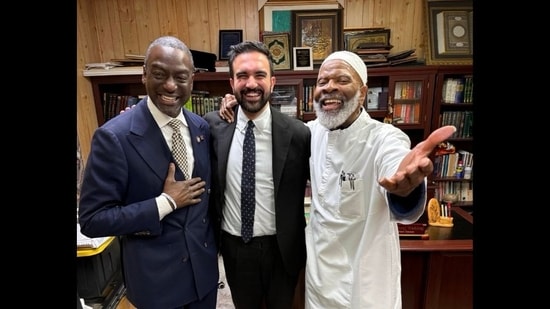Zohran Mamdani came into the New York mayoral race like a thrift-store messiah: scrappy, Instagram-ready, and deliciously hostile to the rent-extraction class. For a hot minute he looked unstoppable — the perfect disruptive foil to the city’s usual procession of pols who smell faintly of leather chairs and regret. Now, three weeks of headlines later, that outsider aura has been run over by something painfully ordinary: receipts.
Here’s the play-by-play of how the populist dream turned into a campaign finance fever dream — and why the people who cheered “drain the swamp” are probably wishing they’d asked to see the water first.
The foreign-donation stumble
First came the small but telling bombshell: roughly $13,000 in donations to Mamdani’s campaign that appear to have originated from outside the United States. It’s the kind of money that won’t buy a Times Square billboard but will buy an ethics inquiry and a weekend of cable outrage. For a candidate selling himself as the antidote to backroom influence, foreign cash is the smell of hypocrisy you can’t mask with a snappy slogan. (See the reporting in the New York Post and NDTV for the ledger entries that led to this eyebrow-lift.)
The billionaire backlash
Then came the answer from the exact thing Mamdani rails against: cash. Bill Ackman — a hedge-fund titan who doesn’t do nuance — wrote a check to a Super PAC explicitly intended to stop Mamdani. That’s the scene millions of voters love: wealthy folks showing their true colors by throwing millions at defeating a working-class narrative. It’s theater. It’s also the exact kind of billionaire reaction Mamdani’s “for the people” rhetoric was supposed to antagonize, which makes one wonder whether the candidate’s team thought that would be the outcome or is simply that tone-deaf. (Politico covered Ackman’s move when the check cleared.)
The DSA checkbook reveals
Then, in a move that felt suspiciously like an accidental admission of whose army is actually doing the heavy lifting, campaign records surfaced showing payments to groups connected to the Democratic Socialists of America for services like “texting” and outreach. Not exactly scandalous on paper — campaigns pay vendors all the time — but the optics are lethal: the “grassroots” candidate looks awfully institutional when his textbank vendor invoices look like payroll for a movement. Cue cries of astroturf from the right, groans of betrayal from centrists, and the slow, delicious collapse of the outsider myth.
The debate that didn’t help
Policy positions meant to solidify legitimacy backfired under live lights. Mamdani tried to thread the needle on public safety and prostitution decriminalization, sparred with Andrew Cuomo, and ended up reminding voters that ideology without governing scaffolding looks, y’know, untested. You can rail all you want about the system, but when the camera zooms in and asks what you’ll do tomorrow, gilded slogans lose their charm. (The New York Post and Washington Post have useful breakdowns of the debate moments.)
The guilt-by-association laundry list
Finally, there are the associations that make centrists reach for their smelling salts: ties, or alleged ties, to controversial figures and influencers who have cheered (or failed to condemn) violence or extremist statements. In New York politics, where every supporter is a potential headline, proximity becomes liability. The narrative becomes less about policy and more about judgment — and judgment, in a mayoral race, is the tail that wags the dog.
The political anatomy of the meltdown
What’s fascinating here is not that a candidate who leans left got flack — politics is a meat grinder that bruises everybody. It’s that Mamdani’s campaign followed the classic arc of thousands before it: charismatic outsider → messy growth → institutional money and professional vendors → optics problem → elite counterattack. It’s the playbook the establishment uses to reabsorb threats: throw money, reveal contradictions, and watch the grassroots myth flounder when audited.
If you want to connect the dots, the same mechanics show up across town and across time. See how predatory institutions cavitate scandal into narrative in our piece on Letitia James: Those in Glass Houses, Letitia James and the Fraud She Condemned. Also note the broader pattern of how activist groups and campaign infrastructures morph into franchise networks in The Franchise Model of Chaos. Those threads explain why Mamdani — who once looked like a corrective to machine politics — now looks like another apprentice learning the cost of running a city-scale campaign. (Both pieces linked here for context.)
The takeaway
Populism without due diligence is just performative rage with a podcast. Mamdani’s message—appealing and necessary as it sounded to those sick of the same old machine—met three immutable forces: money, vetting, and optics. The first roared into the race with Ackman’s check. The second turned up invoices showing who was actually doing the work. The third told the camera that a man who promised to be “for the people” had a campaign that looked suspiciously like everyone else’s.
If Mamdani wants to survive this, he’ll need more than fiery rhetoric. He’ll need a forensic accounting department, a message that explains not just why the system is broken but how his team will fix it without tripping over its own bookkeeping, and the political humility to take the wins and the losses without theatrical martyrdom.
Until he does that, the “socialist savior” will remain a great subplot in someone else’s larger series about how the city’s real power keeps operating the same way it always has — by buying narrative, shaping optics, and making sure the next insurgent learns the cost of being popular.
Citations
- New York Post – “Mamdani’s mayoral campaign took in $13,000 in illegal foreign campaign cash, records show” (Oct 12, 2025)
- NDTV – “Zohran Mamdani under fire for Rs 11 lakh illegal foreign donation: Report” (Oct 13, 2025)
- India Today – “Zohran Mamdani faces scrutiny over illegal campaign funding” (Oct 13, 2025)
- Fox News – “Video: Coverage of Mamdani campaign controversies” (Oct 2025)
- The Washington Post – “Mamdani’s ‘free buses’ push and the mayor’s race” (Oct 11, 2025)
- CBS News (New York) – “NYC mayor’s race: Zohran Mamdani, Andrew Cuomo, Letitia James” (Oct 2025)
- The Hill – “Bannon, Mamdani and the New York City race” (Oct 2025)
- New York Post – “Mamdani’s wife mourns influencer who celebrated Oct. 7 attacks” (Oct 13, 2025)


Pingback: The Hijab That Never Was: Zohran Mamdani’s Subway Story Falls Apart - #TCOT Reporter
Pingback: Mosques and Lesbians: Mamdani’s Campaign Strategy - #TCOT Reporter
Pingback: The Mamdani Machine - #TCOT Reporter